
Journal of Financial Market Infrastructures
Scope & Guideline
Bridging Theory and Practice in Finance
Introduction
Aims and Scopes
- Liquidity Mechanisms and Efficiency:
The journal explores various liquidity-saving mechanisms and their impact on payment systems, highlighting methods to enhance efficiency in liquidity management. - Central Counterparty Risk Management:
Research in this area focuses on understanding and improving the risk management practices of central counterparties, including margin models and stress testing methodologies. - Payment System Innovations:
The journal covers innovations in payment systems, including comparisons between centralized and decentralized networks, and the implications of digital currencies. - Regulatory and Systemic Risk Analysis:
Contributions often analyze the regulatory frameworks affecting financial market infrastructures and systemic risks, particularly in the context of market disruptions. - Cyber Risk and Resilience:
The journal addresses the growing concern of cyber risks in financial systems, offering insights into mitigating strategies and resilience planning. - Procyclicality and Market Stability:
A significant focus is placed on procyclicality in financial markets, examining how different models and policies can stabilize or destabilize the market during economic fluctuations.
Trending and Emerging
- Decentralized Finance (DeFi):
Research on decentralized finance, particularly the effectiveness of decentralized exchanges (DEXs), is on the rise, highlighting a shift towards exploring blockchain technologies and their implications for traditional finance. - Climate Risk Integration:
There is an increasing focus on integrating climate risk into financial decision-making and risk management, reflecting a broader awareness of environmental sustainability in financial markets. - Central Bank Digital Currencies (CBDCs):
The exploration of CBDCs and their potential impact on traditional banking systems is becoming more prominent, as central banks globally consider the implications of digital currencies. - Cybersecurity Measures in Financial Systems:
As cyber threats continue to evolve, research on the transmission of cyber risk and the resilience of payment systems is gaining importance, emphasizing the need for robust security measures. - Advanced Margin Models and Procyclicality Solutions:
There is a growing trend towards developing advanced margin models to address procyclicality, particularly in light of lessons learned from recent financial stress events.
Declining or Waning
- Traditional Cash Payment Systems:
Research related to cash payment systems has diminished, likely due to the increasing digitalization of payment methods and a declining use of cash in many economies. - Historical Financial Crisis Analyses:
While historical analyses of past crises provided valuable insights, the frequency of such studies has decreased, possibly in favor of more contemporary issues such as digital currencies and current market dynamics. - Static Risk Models:
There is a noticeable decline in studies focusing on static risk assessment models, as the field shifts towards dynamic models that can better capture the complexities of modern financial systems.
Similar Journals
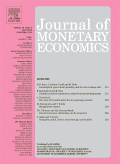
JOURNAL OF MONETARY ECONOMICS
Bridging Theory and Practice in Monetary EconomicsJOURNAL OF MONETARY ECONOMICS, published by Elsevier, stands as a premier platform for scholars and practitioners in the field of monetary economics. With a robust ISSN of 0304-3932 and E-ISSN 1873-1295, this esteemed journal has maintained a significant influence since its inception in 1975, continuing its legacy of rigorous scholarship through to 2024. The journal is recognized for its high impact in the field, boasting a Q1 category in both Economics and Econometrics and Finance as per the 2023 rankings. Its Scopus rankings underscore its prominence, with a top percentile standing in critical categories—a testament to its critical role in advancing research and discourse. While not an open-access publication, it offers invaluable insights for those dedicated to understanding complex fiscal dynamics and economic policies. The Journal of Monetary Economics serves as an essential resource for researchers, professionals, and students eager to explore the intricacies of financial systems and economic theory.

China Finance Review International
Unveiling Critical Research in China's Economic SphereChina Finance Review International (ISSN: 2044-1398; E-ISSN: 2044-1401) is an esteemed journal published by Emerald Group Publishing Ltd, located in the United Kingdom. With a commendable Q1 ranking in the field of finance according to 2023 category quartiles, this journal has established itself as a leading platform for disseminating significant research in the realms of economics, econometrics, and finance, boasting a remarkable Scopus rank of #13 out of 317, placing it in the 96th percentile. The journal focuses on advancing the discourse surrounding financial issues related to China, making it essential reading for academics, professionals, and students eager to explore the dynamic shifts in this critical area of global finance. As it continues to bridge theoretical insights with practical applications, the China Finance Review International aims to foster a comprehensive understanding of financial mechanisms at play within one of the world's most impactful economies.
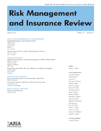
RISK MANAGEMENT AND INSURANCE REVIEW
Exploring the Nexus of Risk and Insurance ExcellenceRISK MANAGEMENT AND INSURANCE REVIEW, published by Wiley, is a vital journal for researchers and practitioners in the fields of accounting, economics, and finance. With an ISSN of 1098-1616 and an E-ISSN of 1540-6296, this journal serves as a comprehensive platform for the dissemination of cutting-edge research and insights into risk management and insurance practices. Although it does not offer an open-access model, it is recognized for its rigorous peer-review process and maintains an impactful presence within the academic community, reflected in its 2023 Scopus rankings in various disciplines, including its Q3 quartile status across multiple categories. The journal's scope addresses key contemporary issues in risk assessment, financial stability, and insurance innovation, contributing significantly to the evolving discourse in these areas. As it converges from 2006 to 2024, RISK MANAGEMENT AND INSURANCE REVIEW continues to attract a diverse readership, providing valuable resources and fostering dialogue among students, professionals, and established researchers alike.
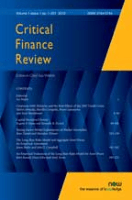
Critical Finance Review
Fostering collaboration for groundbreaking financial theories.Critical Finance Review is a premier academic journal dedicated to advancing the field of finance through the publication of high-quality research that spans various dimensions of the discipline. Published by NOW PUBLISHERS INC, this journal has quickly established itself as a leading source of innovative finance scholarship, achieving a notable Q1 classification in the 2023 finance category. Operating under a rigorous peer-review process, the journal ensures the academic integrity and relevance of its content, which attracts contributions from both emerging and established scholars. With an ISSN of 2164-5744 and E-ISSN 2164-5760, it is accessible to a global audience, though it operates under traditional access models. The journal welcomes a diverse range of topics including, but not limited to, risk management, financial markets, and quantitative finance, making it an essential resource for researchers, professionals, and students who are keen to explore the complexities of financial systems and develop new insights in the ever-evolving landscape of finance. Based in the United States, Critical Finance Review holds a significant position within the academic community, fostering a collaborative environment that encourages innovative thinking and practical applications of financial theories.
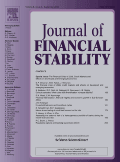
Journal of Financial Stability
Illuminating the path to economic resilience.The Journal of Financial Stability, published by Elsevier Science Inc., is a renowned academic journal that serves as a premier platform for the dissemination of innovative research in the fields of finance, economics, and econometrics. With an ISSN of 1572-3089 and an E-ISSN of 1878-0962, this journal has established itself as a leader in its category, ranking Q1 for both Economics and Finance in the 2023 category quartiles. This positions it amongst the top 13% of journals in Economics and the top 35% in Finance, according to Scopus rankings. Covering a wide range of topics related to financial stability, the journal aims to fulfill its objective of advancing scholarly communication and providing researchers, professionals, and students with valuable insights into contemporary financial challenges and innovations. Operating from the Netherlands and converging from 2004 to 2024, the Journal of Financial Stability continues to contribute significantly to the academic landscape, inviting submissions that push the boundaries of knowledge and understanding in financial systems.
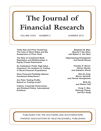
JOURNAL OF FINANCIAL RESEARCH
Transforming Financial Understanding Through ResearchThe JOURNAL OF FINANCIAL RESEARCH, published by WILEY, stands as a pivotal platform for disseminating innovative research in the fields of finance and accounting since its inception in 1978. With an ISSN of 0270-2592 and an E-ISSN of 1475-6803, this journal aims to address contemporary challenges and trends within the financial research landscape. It has achieved notable recognition, being placed in the Q2 category for both Finance and Accounting in the 2023 rankings, signifying its relevance and impact within the academic community. Although it does not currently offer open access, the journal is accessible through various academic databases, catering to a diverse audience of researchers, professionals, and students keen on advancing their knowledge and understanding of financial systems and methodologies. With an evolving scope that encompasses empirical studies, theoretical frameworks, and practical applications, the JOURNAL OF FINANCIAL RESEARCH is committed to contributing valuable insights into the complexities of financial practices and policies.
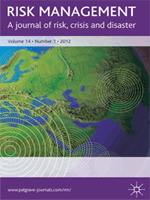
Risk Management-An International Journal
Elevating Risk Management to New HeightsRisk Management - An International Journal is a premier publication dedicated to advancing the understanding and methodologies of risk management across various sectors, including business, finance, and economics. Published by Palgrave Macmillan Ltd in the United Kingdom, this journal not only maintains a robust presence in the scholarly community but also ranks in the Q2 category for Business and International Management and Finance, as well as Q3 for Economics and Econometrics and Strategy and Management. With its diverse scope and commitment to high-quality research, the journal provides essential insights for academics, practitioners, and students alike, helping to shape the future of risk management practices globally. While not an open-access journal, its rigorous peer-review process ensures that only the most impactful and relevant studies are featured. Covering topics that converge the years from 2006 to 2024, Risk Management represents a vital resource for those looking to deepen their knowledge in this critical field.
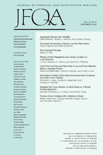
JOURNAL OF FINANCIAL AND QUANTITATIVE ANALYSIS
Elevating Knowledge in Finance Through Empirical EvidenceJOURNAL OF FINANCIAL AND QUANTITATIVE ANALYSIS, published by Cambridge University Press, is a premier peer-reviewed journal that has been at the forefront of the finance and economics fields since its inception in 1966. With a notable impact factor reflecting its Q1 status in Accounting, Economics and Econometrics, and Finance for 2023, the journal is recognized for its substantial contributions to both theoretical and empirical research. Researchers and practitioners alike benefit from its comprehensive scope, addressing critical issues in financial analysis and quantitative methods. Although the journal does not currently offer open access, it remains widely accessible through institutional subscriptions. The editorial team is committed to fostering rigorous academic discussions that shape the future of finance and economics, making it an essential resource for academics, students, and industry professionals seeking to deepen their understanding of these vital disciplines. For more than five decades, this journal has continued to be an indispensable platform for disseminating influential research, thus solidifying its role as an essential cornerstone in the financial and quantitative analysis community.
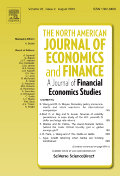
North American Journal of Economics and Finance
Elevating scholarship in economic and financial research.The North American Journal of Economics and Finance is a premier academic journal published by Elsevier Science Inc. since 1992, dedicated to advancing the field of economics and finance through rigorous research and scholarship. With an impressive impact factor and recognition in the Q2 category for Economics and Econometrics and Q1 for Finance as of 2023, this journal holds a significant position in the academic community, ranked #41 out of 317 in Finance and #100 out of 716 in Economics. The journal features high-quality, peer-reviewed articles that cover a broad range of topics, from theoretical frameworks to empirical analyses and practical applications. Though not an open-access platform, the journal provides valuable insights for researchers, practitioners, and students alike, promoting knowledge dissemination in the dynamic landscape of economic and financial studies. With its commitment to excellence, the North American Journal of Economics and Finance serves as an essential resource for those seeking to deepen their understanding of contemporary issues in these critical fields.
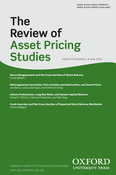
Review of Asset Pricing Studies
Connecting Theory and Practice in Asset PricingThe Review of Asset Pricing Studies, published by Oxford University Press, stands as a leading journal in the fields of Economics and Finance, recognized for its rigorous analyses and innovative research since its inception in 2011. This esteemed publication maintains an impressive impact factor and ranks in the Q1 category for both Economics and Finance as of 2023, consistently occupying top positions in Scopus rankings across its relevant categories. With a clear focus on advancing knowledge in asset pricing and investment strategies, the journal serves as a vital platform for researchers, professionals, and students seeking to contribute to and stay informed on the latest developments in these dynamic fields. Despite its lack of open access, the journal ensures wide circulation and accessibility through its reputable publisher, thereby fostering an engaged academic community.